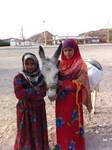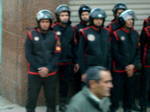Egypt and Jordan -- The 2011 Arab Revolution reaches back for decades in long-term economic inequity and political tyranny, but what lit the current powder keg is simple human connection, made possible by multisource news and social media. After police pulled businessman Khaled Said out of an internet café last June in Alexandria, Egypt and killed him because he had evidence of police corruption, a Facebook page called "We Are All Khaled Said" went viral with more than 473,000 users. Neighbors around Egypt cared. And when protests sparked in Tunisia after the self-torching of Mohamed Bouazizi, neighbors in surrounding Arab countries cared. They had means of expressing both views and support--and the unstoppable freedom of being able to write and read together as a community, as we are doing here on this page.

(photo by Patty Murphy)
Now, I would proffer that neighbors in countries all over the world care about what happens to the people, antiquities, economy, and government of Egypt--not just because we need to get oil out through the Suez Canal. We care because we know, and we know because now, we can. Communications technology catalyses a primal impulse toward civil rights that cannot be contained.
Arriving in Cairo just two days prior to Egypt's explosion, I witnessed firsthand what Egypt looked like on its last old-normal day.
Egypt's Last Normal Day
In a group of 38 American tourists from the Smithsonian and the National Trust (some of whom have saved and dreamed for a lifetime to see Egypt's towering pyramids and pharaonic tombs), we land unwittingly amidst the uprisings, and proceed to spend several days moving just ahead of the mounting danger.
We walk through the museum of Coptic Christianity and then immerse ourselves in Islam, the religion of pure monotheism and 5-pillar devotion embraced by 90% of Egyptians and 1/7 of the world's population. We stroll the grand Muhammad-Ali Mosque, viewing Cairo from the bird's nest of Saladin Citadel above the city, and buy local trinkets at Khan el-Khaliki Bazaar. We move freely through a friendly, vibrant community of nearly 20 million urbanites. Our smiling guide Ahmed calls himself "Mr. President Obama," proud that his compatriots see a resemblance in him to the U.S. president.
However, by the time dusk splays across the city and our bus snakes its way back across Tahrir Square, we come head to head with a human blockade of police with semiautomatics and shields. They will not allow us to cross the Nile River. The scene begins to look ominous. I stare through the bus window at the faces below and realize these men look very young and a little scared. In Egypt, 49% live below the World Bank's measure of poverty ($2/day) and 80% live on less than $3. These guys only make minimum wage, and they're just trying to make a living. They, too, have no idea what will unfold: that they will retreat and be replaced by tens of thousands of army troops facing down a million street protestors. They, like we, cannot know that looters will overpower their authority, destroy inventory, and threaten the safety of hardworking families across Egypt. They cannot foresee that communications, banking, schools, and industry will come to a halt and their loved ones will remain essentially under house arrest for weeks, perhaps months, to come.

(photo by Cathy Lewis)
Meanwhile for us tourists, our savvy Egyptian guides finagle a police escort that evening across the bridge to the haven of our Western hotel. Next day, we--along with thousands of other tourists from Europe, Asia, and the U.S.--throng the Egyptian museum, oohing at the coins, papyrus, and scarabs downstairs and aahing at the Tutankhamen treasures and the Pharaoh mummy room upstairs. This is the last day for some time the world-renowned museum, itself soon to be looted, will be open for business.
We lose contact with our families when President Hosni Mubarak shuts down the country's Internet and attempts to limit social media. We flee Cairo but go only as far as Luxor, to float in hot-air balloons over the Valley of the Kings. As Mohamed ElBaradei begins to rally support for the Muslim Brotherhood, we pose for photographs among the pillars of the Luxor, Hatshepsut, and Karnak Temples. Angry mobs replace the original organized, peaceful protestors and proceed to kill hundreds and harm thousands. Systematically, everything shuts down -- the Cairo airport, banks, stores, and schools. Finally, we begin to make our way out of the country.
Escaping the Chaos
We push on in our cushioned buses to the port city of Hurghada and board a small ship to head out into the Red Sea. We have not experienced the slightest inconvenience or danger. The contrast between our sumptuous meals and lavish accommodations and the daily struggle of our Egyptian hosts--even before this crisis--strikes me as garish, insulting, rude. Our American tour operator, Mr. Ati Jain of Cross Culture Journeys, disagrees. "Tourism is the lifeblood of this country," he tells me, creating 25% of GDP and employing 2.6 million of Egypt's 80 million residents.
"You have come here because you love our country," one local tells me. "We thank you for coming here and we love you for bringing your business here."
Ms. Sonia El Masiri, an Egyptologist from Alexandria who has worked for nearly half-century in the tour business, laments the violence of the few that has undermined safety for the whole. "These hooligans are ruining the country for everyone," she shakes her head sadly. She has just spent our last five days sharing her encyclopedic knowledge answering any question from any discipline or perspective. Now she just wants to get safely back to Cairo where her husband, daughters, sons-in-law, and grandchildren are all huddled together in her 4th-floor apartment. As with millions of peaceful citizens, they have out of necessity set up a neighborhood watch, standing guard with kitchen knives and brooms.
Sonia and several other Egyptians I speak with tell me that they dearly wish their voices would be heard above the din of extremists and looters. What they want sounds a bit like the dream from my childhood home: peace, freedom, safety, economic security . . . democracy with a small d.
Now in Jordan (with the fast-thinking Mr. Jain, who has kept us out of harm's way but also made impeccable arrangements to see the sites of Jordan and Israel in place of the pyramids and sphinx), we finally get back online but still feel ourselves hovering in the unreality of having just been in the middle of a crisis that continues and worsens after we've gone. Mubarak makes his public declaration that neither he nor his son will run and calls for constitutional reform, but the protestors' fury increases when he does not immediately step down. Here in Jordan, King Abdullah abruptly replaces of his own cabinet in a quick move by Jordan's "semidemocratic monarchy" in response to the wishes of her people.
In Aqaba, we change the flag on the ship from Egyptian to Jordanian, but we take our affection for the people we have just met along with us. Zuhair Dmour, our guide through Petra and the Wadi Rum, talks about how deeply we all feel the effects of Egypt's explosion -- not just in the Middle East. "The whole world is becoming a small village," he says. Tyrants can no longer overpower their subjects, who are now armed with news, social media, and global empathy.
Al Qaeda terrorists make their way up the Sinai peninsula from Sharm al-Sheik to the Israeli border, always a close step behind our group. We cross from Jordan into Israel on Friday, just a day before gas lines and a church are blown up near the exact point at which we cross.
Our group wonders why we lucked out in safety when our new Egyptian friends remain hungry, scared, and hurt in what turned from a peaceful protest into anarchy of war.
Friending Egypt
And I wonder as I continue on my privileged journey, what can I as a U.S. citizen do for my Egyptian neighbors?
It's pretty simple: I could be a better friend to Egypt. There are myriad ways, like cooking her food or reading her history. Like a dear old friend we've taken for granted for millennia, however, Egypt now needs my attention beyond that of a consumer of her legacy and beauty. With three simple steps I can easily begin.
Being in the nonprofit business, I had hoped to visit a couple of microfinance and school programs in Cairo after our tour - meetings now canceled, as the city remains paralyzed. Still, from home I can do more to learn from and correspond with Egyptian experts working to effect social change, and offer them my moral support or donated dollars.
Second, I can listen closely to the multiplicity of voices emerging from an Egypt far too long silenced under the 30-year dictatorship of the outgoing president. I can hear, respect, and repeat the message of my new friends in the Valley of the Nile. Ahmed and Manal, Sharif and Sonia, can be amplified every time I tell someone back home about their struggles and dreams.
And finally, I can come back. As President George Bush told American citizens after the terrorist attacks of 2001--and any survivor of violence can testify to this--the best revenge is to live well, go on, survive, and thrive. I hold the vision of an Egypt whose people's voices get heard, an Egypt that makes its way through this muck into fair elections and rebuilds its constitution and governance to represent one and all, in peace. I see an Egypt who, more stunning now than in her antiquity, receives guests from all over the world who bring more than cash. Next time, we'll pack a deeper understanding of our hosts. We will come back, and soon, and as friends.
(Note that this is a revised version of a post that, due to transmission glitches, appeared in rough-draft form last week from Jordan. I invite your comments on your own experiences connecting to global communities through media connection or physical travel.)